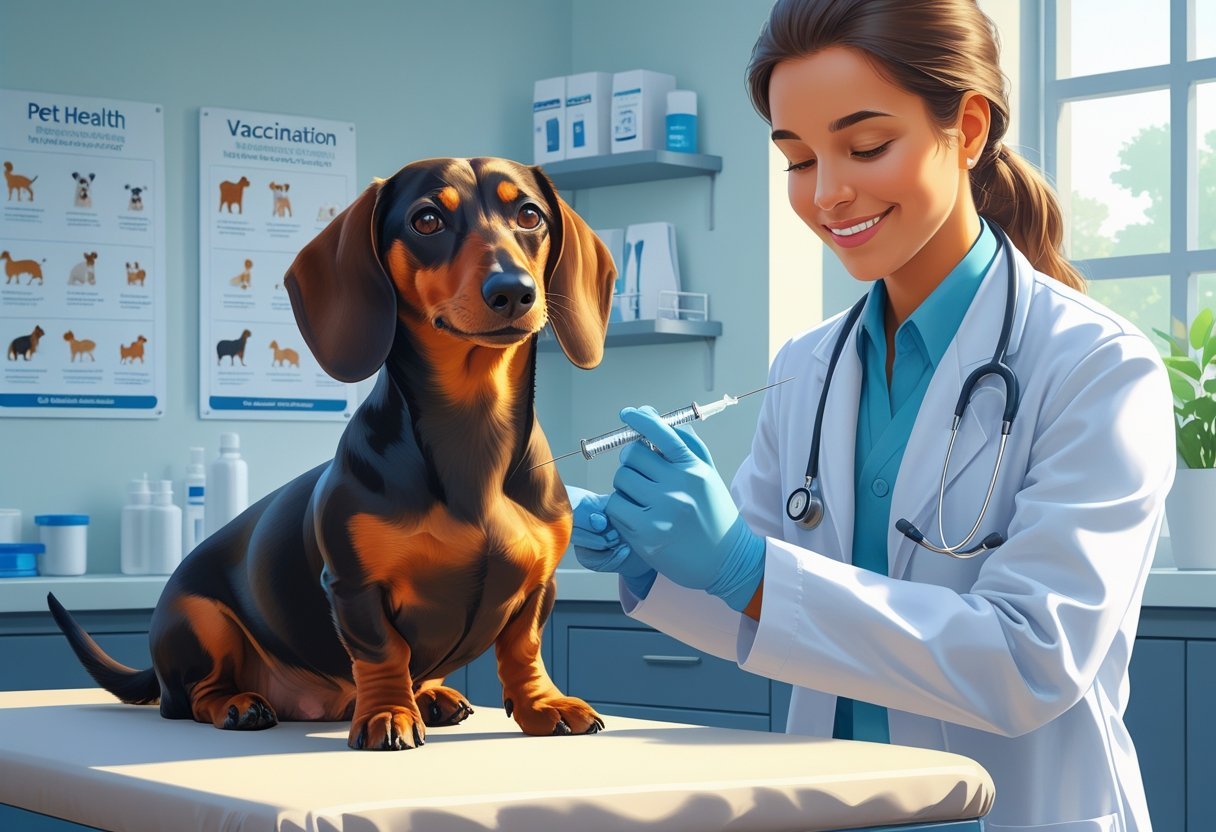Vaccinations play a big role in keeping your Dachshund healthy and safe from nasty diseases 🐾.
Making sure your Dachshund stays up to date on vaccines can prevent a lot of common, dangerous illnesses 💉.
It’s totally normal to wonder which shots your dog really needs and how often they should get them 🤔.
Understanding the vaccine schedule and knowing what to expect makes the whole process easier for both you and your pup 🐶.
You want to do right by your Dachshund, so having the right info can help you feel confident 📘. This guide lays out the steps and answers questions you might have along the way.
Key Takeaways 📌
- Vaccines protect your Dachshund from serious health risks 🛡️.
- Your vet can create the best vaccination plan for your dog 👩⚕️.
- Staying informed helps you avoid common mistakes in dog healthcare ✅.
🐾 Free Dachshund Care Guide
Download our free checklist to ensure your Dachshund stays happy, healthy, and well-loved!
Get Your Free Guide 🐶Why Vaccinations Matter for Dachshunds
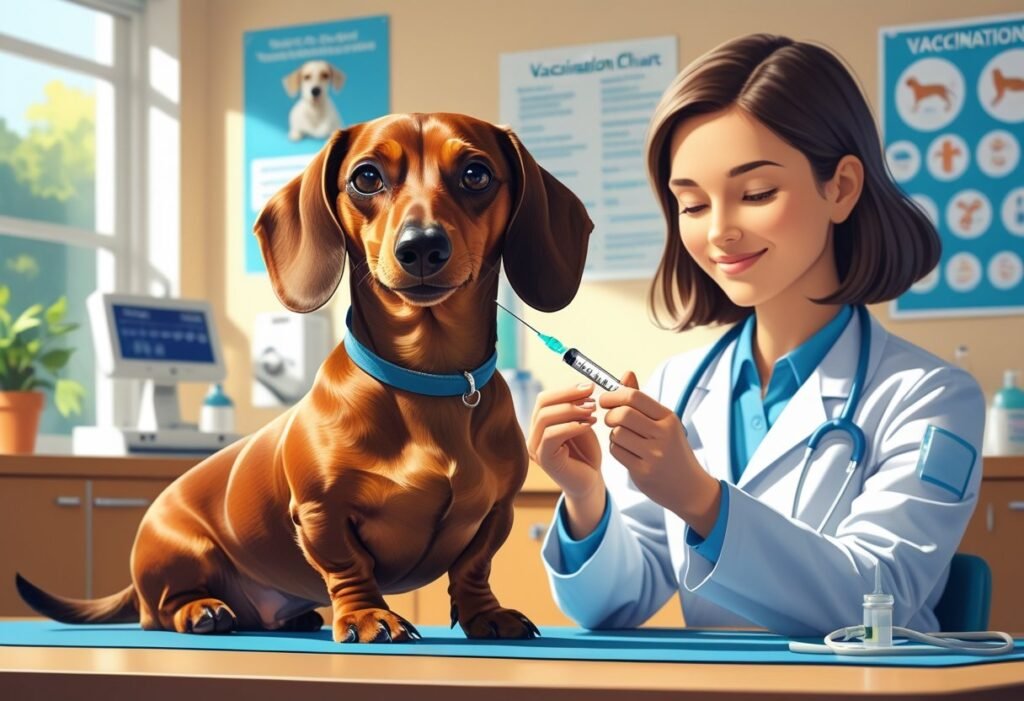
Dachshund vaccinations protect your dog from diseases that can cause lasting harm or even death 🐾.
When you keep your doxie’s shots up-to-date, you help stop disease outbreaks in your home and community 🏡.
Risks of Unvaccinated Dachshunds ⚠️
If your dachshund isn’t vaccinated, they’re more likely to catch things like parvovirus, rabies, and distemper 💉.
Some of these are deadly or can leave your dog with health problems for life 🛑.
Puppies are especially at risk because their immune systems are still developing 🐶.
Viruses spread quickly in places like dog parks, boarding kennels, or when you have other pets at home 🐕.
Not vaccinating also puts your family at risk, especially with diseases like rabies that can pass to humans 👨👩👧👦.
If your dachshund is exposed to rabies and doesn’t have proper vaccination records, they might be quarantined or even put down 😔. That’s a tough situation nobody wants.

🥗 Wild Earth Plant-Based Dog Food – Gentle Nutrition for Healthy Doxies
Vaccines protect your Dachshund from disease, but diet fuels lasting immunity. This clean, plant-based recipe keeps your pup strong without harsh fillers.
- Supports long-term immune health 🌿
- Great for sensitive stomachs after vaccinations 💚
- Balanced protein for daily energy 🐾
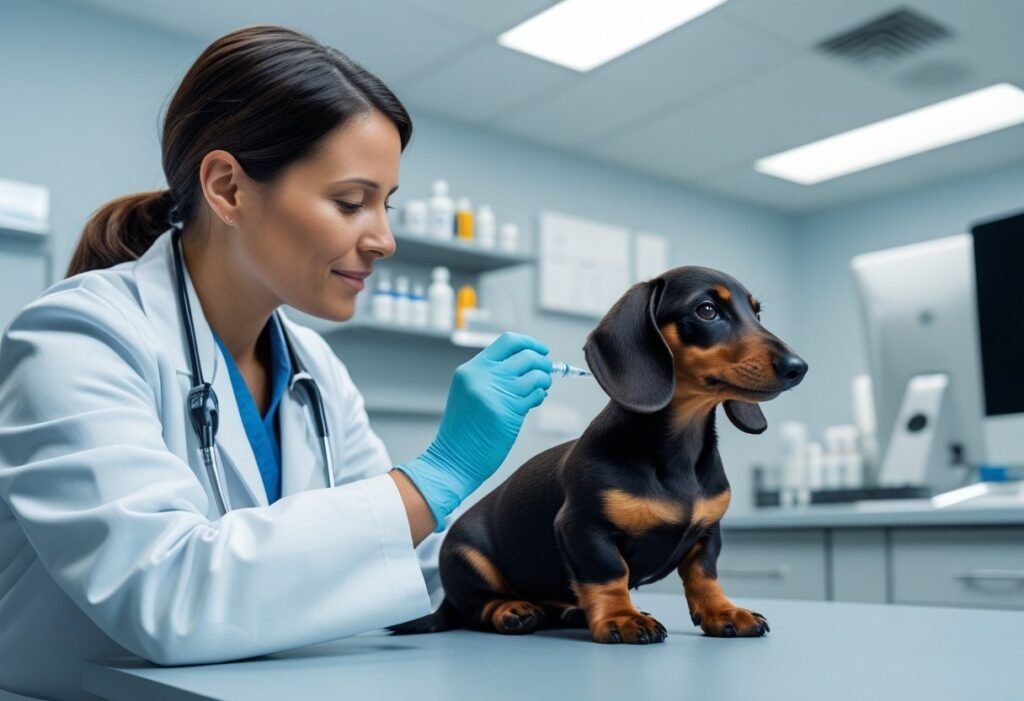
Impact of Vaccinations on Doxie Health 💊
Vaccines boost your dachshund’s immune system so they can fight off harmful germs 🛡️.
With regular shots, you lower the chance of emergency vet visits from preventable sickness 🚑.
Key health benefits include:
- Fewer outbreaks of kennel cough, parvovirus, and leptospirosis in your household 🏠.
- Less risk of spreading diseases to other dogs or people 🐕.
- Better odds your dachshund lives a longer, healthier life 🌟.
Staying on schedule with vaccines also makes travel and boarding easier, since most places want proof of shots ✈️.
Preventing serious illness with vaccines is almost always cheaper than paying for emergency care if your dog gets sick 💵.
Core Vaccines Dachshunds Need
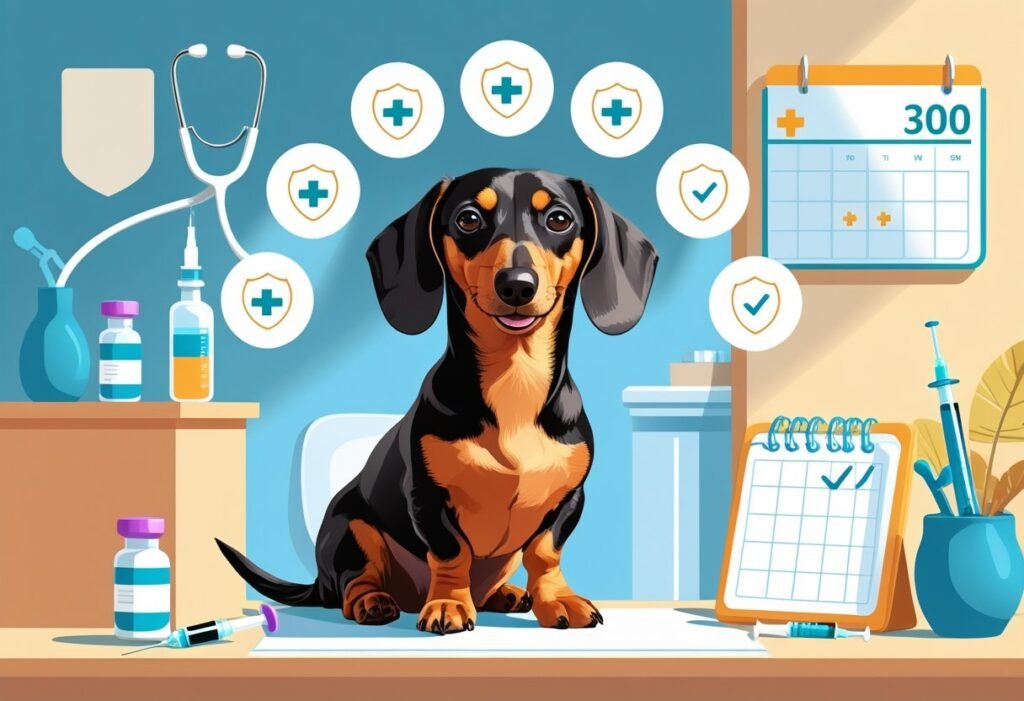
Core vaccines keep your Dachshund safe from diseases that spread easily and can be deadly 🐾.
These shots help your dog build strong immunity and stay healthy at home and in public 💉.
Overview of Core Vaccines 📝
Dachshunds need a few key vaccines to protect against contagious and life-threatening illnesses 🛡️.
The main core vaccines are:
- Canine Distemper 🧠
- Parvovirus 🦠
- Adenovirus (Canine Hepatitis) 🏥
- Rabies ⚠️
Your vet usually gives these as a combo shot, often called the DHPP or DAPP vaccine 💊.
Puppies should start these shots at 6–8 weeks old, with boosters every 3–4 weeks until about 16 weeks 🐶.
After the puppy series, a booster comes a year later, then every 1–3 years based on your vet’s advice and local laws 📅.
The rabies vaccine is usually required by law and needs regular updates, but rules depend on your state ⚖️.

🛡️ The Swiftest – Compare Pet Insurance Plans for Peace of Mind
Vaccinations are just one part of your Dachshund’s care. With The Swiftest, you can compare pet insurance options to keep vet visits stress-free and affordable.
- Find the right coverage for vaccination visits 💉
- Compare trusted insurers side by side 📊
- Protect against unexpected vet bills 🚑
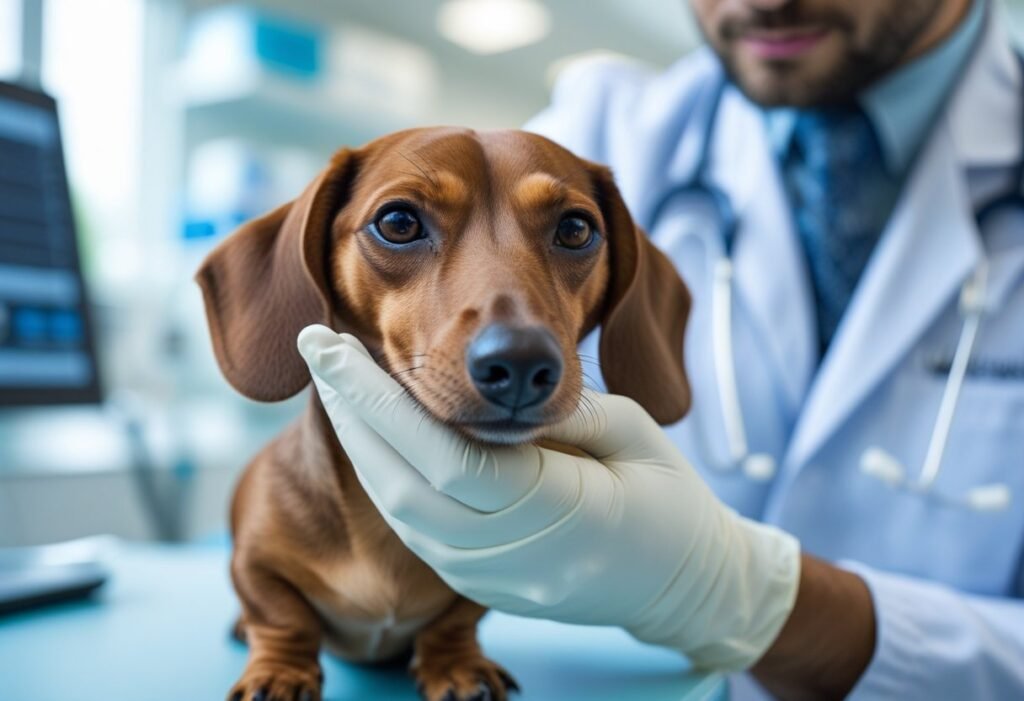
Protection Against Deadly Diseases 🚑
Each core vaccine shields your Dachshund from a different virus that can cause severe illness 🩺.
Distemper damages the brain, nerves, and organs. Parvovirus attacks the gut and immune system, leading to deadly dehydration and infection if not treated ⚡.
Adenovirus causes hepatitis, which can lead to liver failure and death. Rabies affects the brain and is always fatal once symptoms show up. It can also spread to people and other animals ❗.
Staying up to date on these vaccines is hands-down the best way to keep your Dachshund safe 🌟.
If you miss booster shots, your dog’s immunity can weaken, leaving them open to infection. Always go by your vet’s guidance on the vaccine schedule ✅.
Puppy Shot Schedule for Doxies
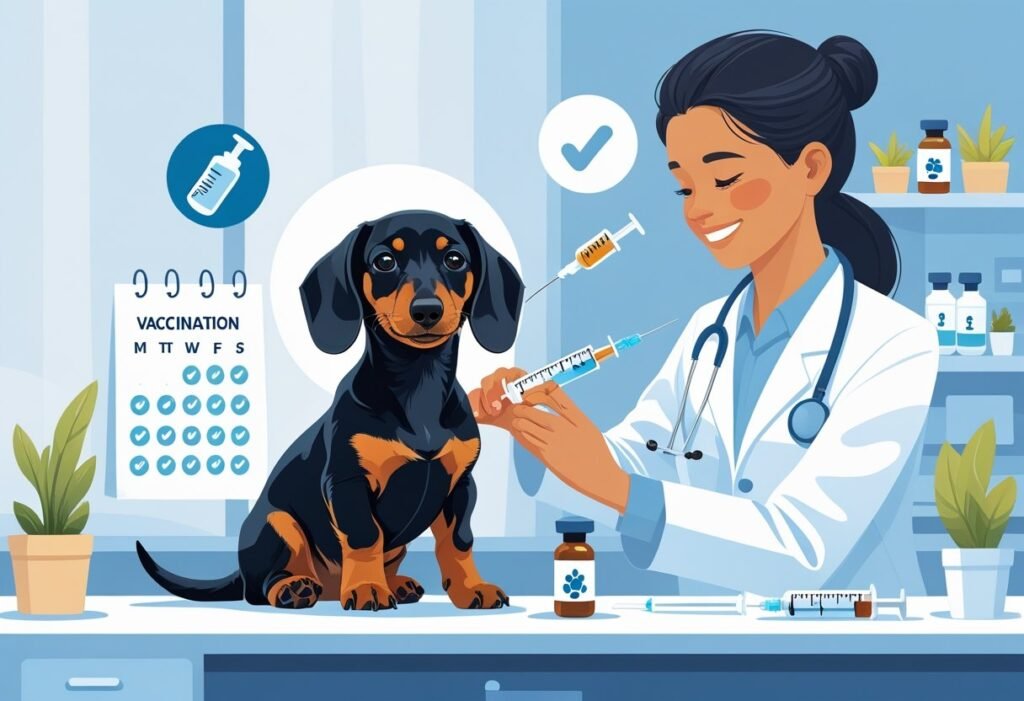
Your Dachshund puppy needs certain vaccines at set times for strong protection against common diseases 🐾.
Sticking to the shot schedule helps keep your pup safe from stuff like parvo, distemper, and rabies 💉.
First-Year Vaccination Timeline 📅
Dachshund puppies start with some immunity from their mom, but that fades after a few weeks 🐶.
Most pups begin vaccines at 6 to 8 weeks. Vaccines are given in stages, usually every 3-4 weeks, until your Doxie is at least 16 weeks old 🛡️.
The typical first-year vaccine schedule looks like this:
Age – Vaccines Given
- 6-8 weeks – DHPP (Distemper, Hepatitis, Parvo, Parainfluenza) 🧬
- 10-12 weeks – DHPP, Bordetella (if needed) 🐕
- 14-16 weeks – DHPP, Rabies, Leptospirosis (may depend on your location) ⚠️
Your vet might add other vaccines for Lyme or canine flu if local risks are high or your Doxie is around other dogs a lot 🌎.
Keep all appointments and ask your vet for a copy of your puppy shot schedule for reference 📖.

👩🍳 ChefPaw Food Maker
- Cook fresh meals tailored to your Dachshund 🍲
- Control ingredients for better immunity
- Easy to use for weekly meal prep

⏲️ Petlibro Auto Feeder
- Set feeding times for vaccine recovery days 🐾
- Prevents overeating with precise portions
- Peace of mind when you’re away
Recommended Age for Each Vaccine 📝
- DHPP: First dose at 6-8 weeks. Repeat every 3-4 weeks, with the last dose at 14-16 weeks 💊.
- Rabies: One shot at 14-16 weeks. Usually required by law ⚖️.
- Leptospirosis: Can start as early as 12 weeks if needed. Ask your vet if your Doxie should get it 🧪.
- Bordetella: Given once between 8-16 weeks, especially if your puppy goes to parks, daycare, or boarding 🏞️.
It’s important to stick to the timing. Missing a dose or delaying shots can lower your puppy’s protection and might mean starting over ⏳.

Booster Shots and Follow-Ups 🔄
After the first year, booster shots keep your Dachshund immune 💉.
DHPP usually needs a booster at one year, then every 1-3 years after that, depending on your vet’s advice 📆.
Rabies shots get boosted after the first year, then every 1 or 3 years, depending on your local law and the vaccine type ⚠️.
Other boosters, like Bordetella or leptospirosis, may be needed yearly, especially if your Dachshund is at higher risk 🐕.
Routine checkups are a great time to ask if your Doxie is due for any vaccines 🩺.
Keeping good records means your pup never misses a dose and stays healthy. It’s easy to lose track otherwise 📂.
Non-Core Vaccines and Special Considerations
Not all vaccines are required for every Dachshund 🐾.
Some are optional, depending on your pet’s lifestyle, risk of exposure, and local disease outbreaks 🌎.
Optional Vaccines for Dachshunds 💉
Non-core, or optional, vaccines are given in certain situations 📝.
The Bordetella vaccine helps protect your dog from kennel cough, which spreads quickly in places like boarding kennels and grooming salons 🐕.
The Leptospirosis vaccine protects against a dangerous bacteria found in water or soil 💧.
The Lyme disease vaccine is another option in areas with lots of ticks. If your Dachshund isn’t exposed to ticks, you probably don’t need it 🐞.
Canine influenza vaccine might be suggested for dogs that go to dog parks or daycare 🏞️.
Your vet can help you figure out which, if any, of these vaccines matter for your dog 🩺.

🧬 AnimalBiome Gut Health Test
- Check gut balance for post-vaccine digestion
- Identify hidden tummy issues 🐶
- Personalized supplement suggestions
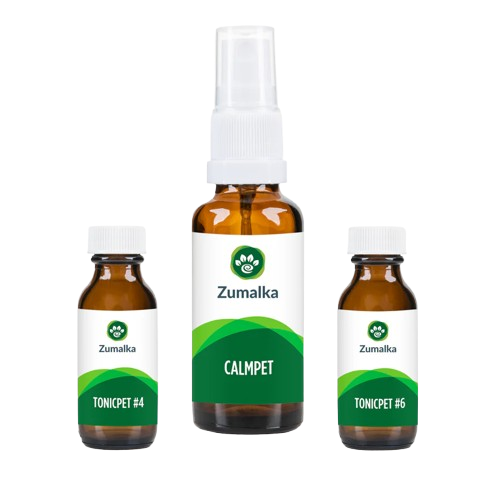
🌿 Zumalka CALMPET Drops
- Natural calm for vet visits 💉
- Helps ease stress during vaccines
- Safe, gentle homeopathic formula
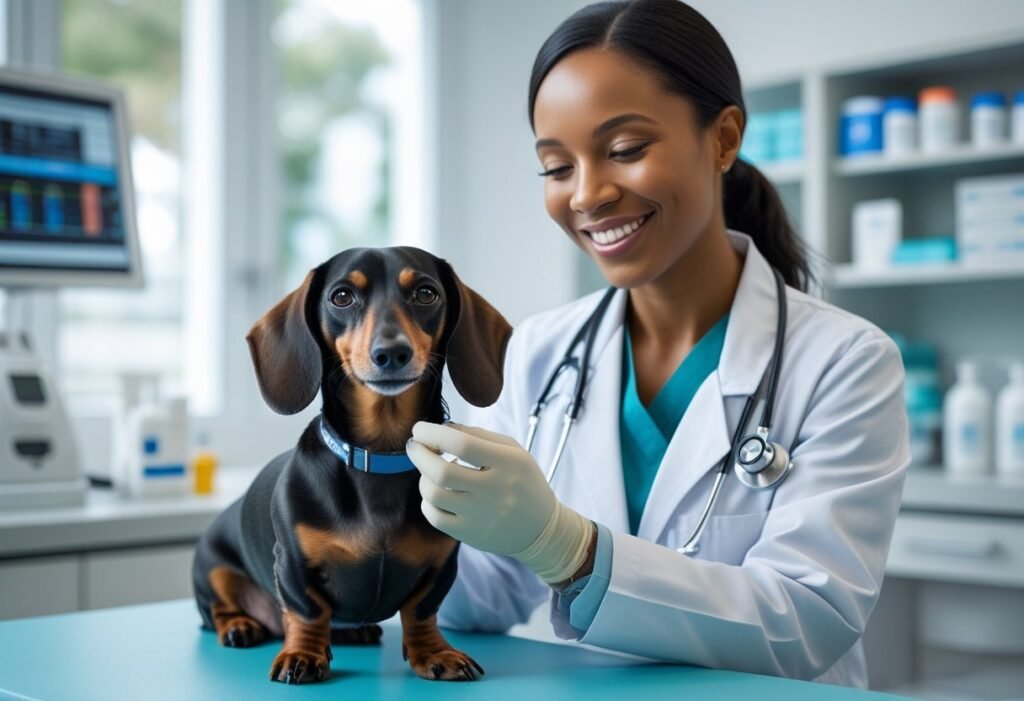
🎉 Grab your free Dachshund care checklist!
Common Non-Core Vaccines 📋
Vaccine – Disease Prevented – When to Consider
- Bordetella – Kennel Cough – Boarding, grooming, parks 🐾
- Leptospirosis – Leptospirosis – Rural areas, swimming 💦
- Lyme Disease – Lyme Disease – Tick-heavy regions 🌲
- Canine Influenza – Dog Flu – Daycare, urban areas 🏙️
Risk Factors That Influence Vaccine Choices ⚠️
Where you live and how your Dachshund spends time both matter when picking vaccines 🏡. If your area has cases of Leptospirosis in wildlife, you might need that vaccine even with a small yard 🦌.
Dogs who walk in woods or fields bump into more ticks and may need the Lyme vaccine 🐞. If your pup attends doggy daycare, travels, or visits dog parks, the risk of catching kennel cough or canine flu goes up 🐕.
Older dogs or those with certain health issues might need a different vaccine schedule 🧓. Your vet will help you weigh your Dachshund’s age, size, activities, and health when making vaccine decisions 🩺.
Talk with your vet whenever your dog’s lifestyle changes or you move to a new area ✈️. It’s always better to check than to guess ✅.
Potential Side Effects and How to Respond
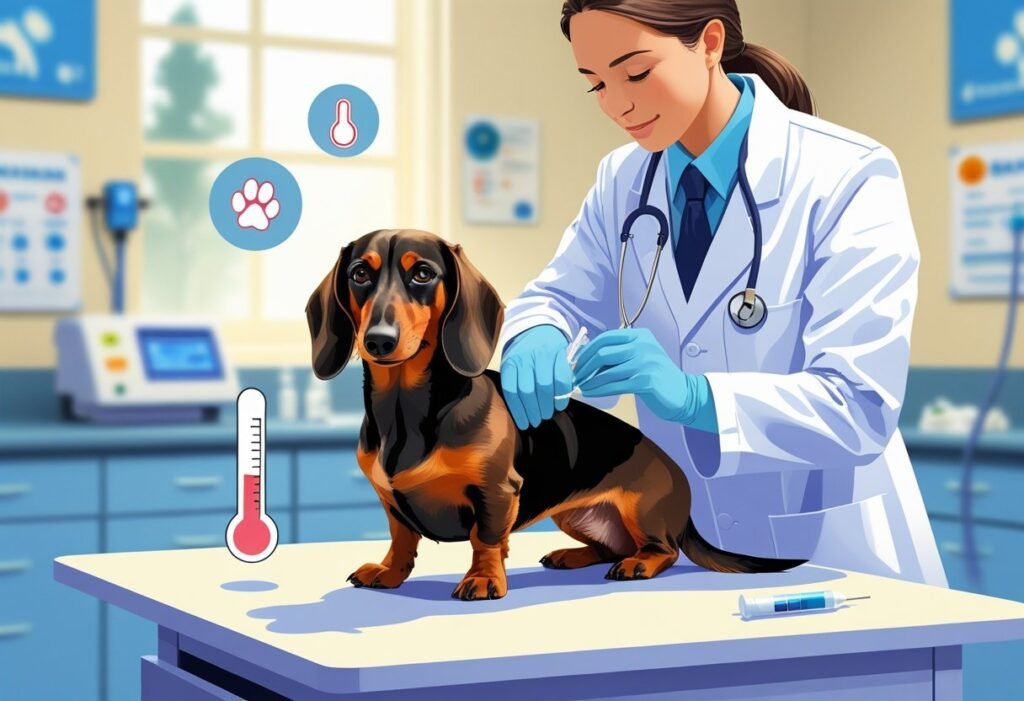
Dachshunds sometimes get mild side effects after vaccines. Serious problems are rare, but it helps to know what’s normal and what’s not 🐾.
Common Vaccination Reactions 💉
Most Dachshunds show mild, short-lived side effects after shots. These usually pop up within a few hours and fade by the next day or so ⏳.
- Sleepiness or lower energy 😴
- Slight swelling or soreness at the shot site 💢
- Mild fever 🌡️
- Less appetite 🍽️
Your Dachshund might nap more or skip a meal, but usually feels better soon 🐶. These signs are common and not usually dangerous ✅.
To help your pup, offer fresh water and a comfy spot to rest 💧. Skip the wild play for a bit, and check the injection area gently—light swelling is normal if your dog seems fine otherwise 🛏️.

📹 Petcube Cam 360
- 360° camera keeps watch over your Doxie 🐶
- Two-way talk for comfort during rest days
- Night vision for peace of mind
📍 Tractive GPS Tracker
- Real-time GPS keeps your Dachshund safe
- Set safe zones with instant alerts 🚨
- Waterproof & adventure-ready design

When to Contact Your Veterinarian 🚨
Sometimes, side effects signal something more serious. Watch for these signs and contact your vet right away if you see ⚠️:
- Vomiting or diarrhea that does not stop 🤢
- Swollen face, muzzle, or eyes 😟
- Hives (raised bumps) 🔴
- Trouble breathing 😮💨
- Weakness or collapse 🛑
Severe reactions can hit minutes to hours after the shot ⏱️. If you notice any of these, call your veterinary clinic as soon as possible 📞.
Keep your vet’s number handy on vaccination day. Quick action matters if your dog has a strong reaction—especially with breathing problems 🩺.
Tips for a Safe and Stress-Free Vaccination Experience
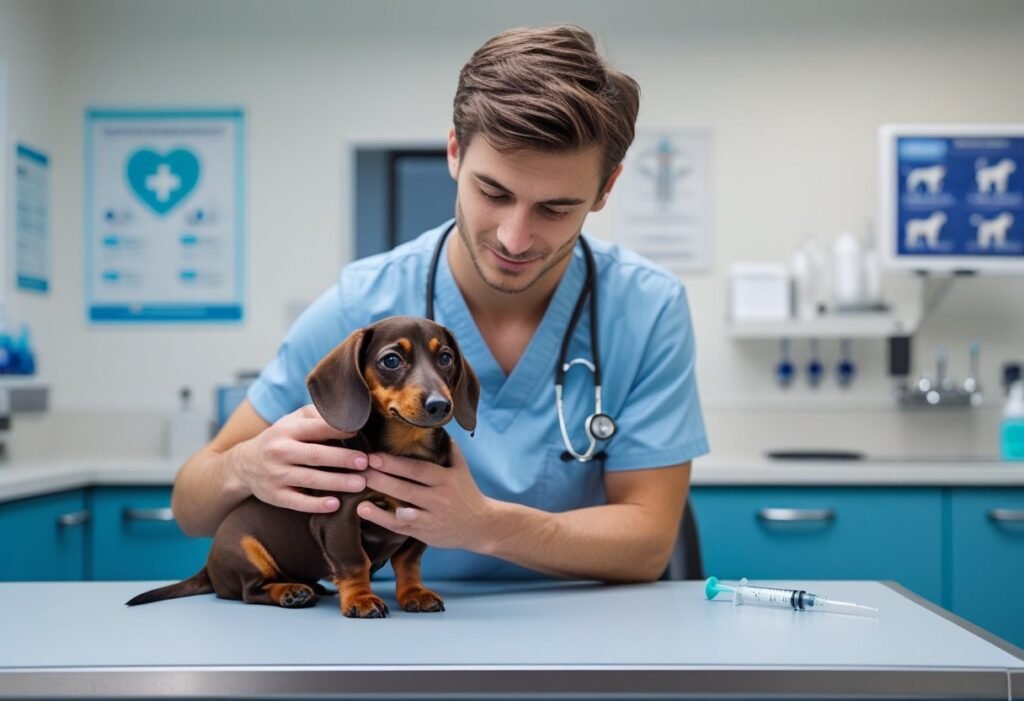
Calm handling and the right care before and after shots make vaccinations easier for your dachshund 🐾. Familiar items, gentle touches, and watchful monitoring help your dog feel secure 🛡️.
Preparing Your Dachshund for Shots 💉
- Plan your vet visit for a quiet time of day when your dog is calm 🕰️
- Bring your dachshund’s favorite blanket or toy for comfort 🧸
- Avoid feeding a heavy meal just before the appointment to prevent an upset stomach 🍽️
Before the visit, take your dog for a short walk 🚶. A little exercise can take the edge off their nerves 🌿.
When you get to the clinic, use a short leash or a carrier so your dachshund feels safe 🐕. Speak to your dog in a calm, soothing voice and reward them with treats for calm behavior 🍪.
Be honest with the vet about any past reactions or health concerns 🩺. Make sure you understand which shots your dachshund is getting 📋.
Ask if you can stay by your dog during the vaccination. Your presence helps ease stress ❤️. Keep visits as quick and relaxed as possible ⏳.

🛏️ Majestic Pet Orthopedic Bed
- Supportive cushioning for post-vaccine rest
- Orthopedic comfort for tired joints 💛
- Machine-washable cover for hygiene and easy care

🧴 Pride + Groom Grooming Tools Kit
- Keep your Dachshund clean and refreshed post-vet visit
- Gentle grooming reduces irritation around vaccination areas 🐾
- Promotes relaxation and comfort during recovery
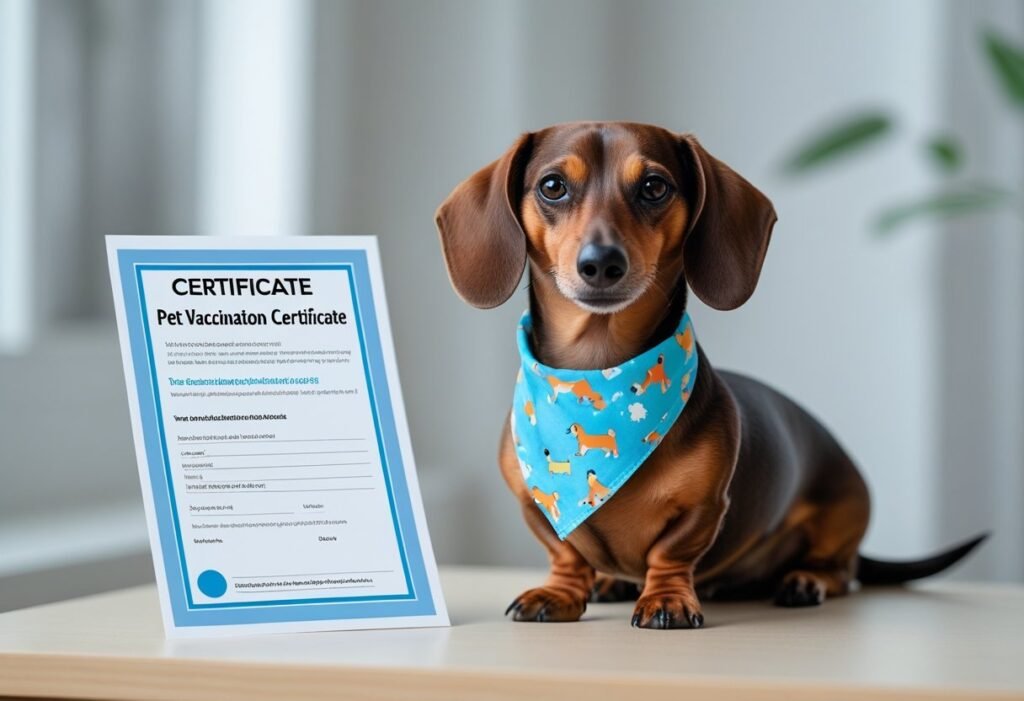
Post-Vaccination Care for Doxies 🐶
After vaccines, keep an eye on your dachshund for a few hours 👀. It’s normal for your pup to be sleepy or a bit sore at the shot site 💤.
Some dogs may have mild swelling, low energy, or a small bump 💢. Let your dog rest in a quiet space with fresh water 💧. Skip rough play for a day 🎾.
Offer food if they’re hungry, but don’t force it 🥣. If your dachshund seems uncomfortable, gentle petting or a soft blanket can help 🛏️.
Signs to watch for:
- Fever 🌡️
- Vomiting or diarrhea 🤢
- Difficulty breathing 😮💨
- Swelling of the face or hives ⚠️
If any of these happen, call your vet right away 📞.
Most side effects pass in 24–48 hours ⏱️. It’s smart to keep your vet’s number nearby just in case ✅.
Frequently Overlooked Aspects of Dachshund Vaccination
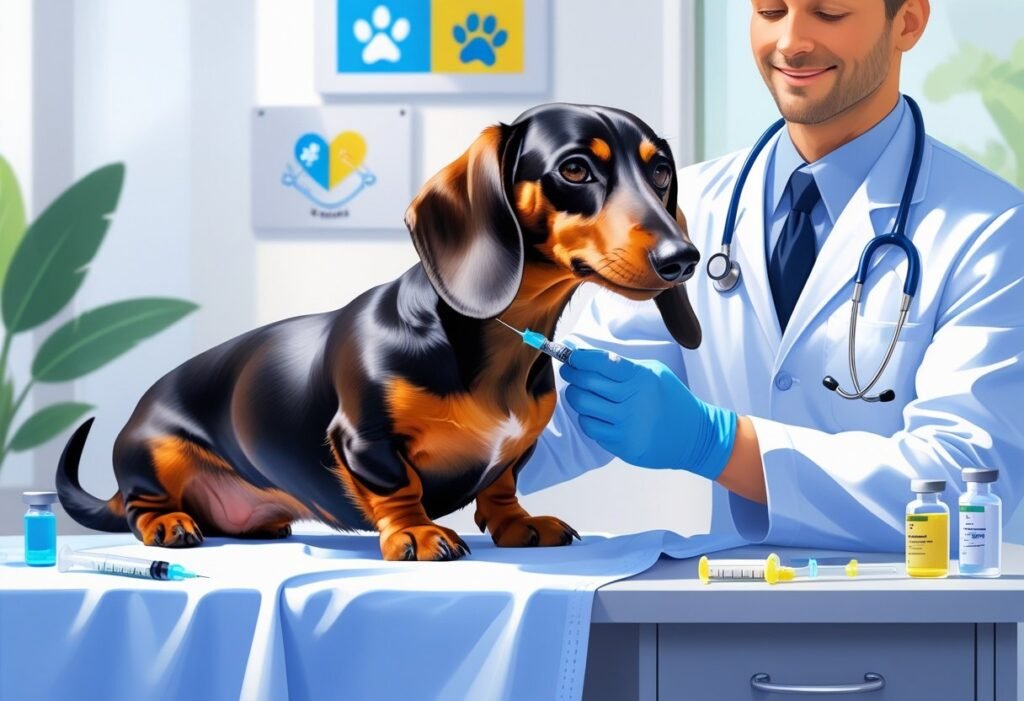
Many dachshund owners miss small details that affect how well their pets are protected 🐾. Your pup’s vaccination plan might need special attention based on where you live or how you keep records 📋.
Regional and Environmental Factors 🌎
Where you live shapes which diseases your dachshund might face 🐕. Some viruses and bacteria are more common in certain regions 🦠.
Leptospirosis is more likely in damp or rural areas, while Lyme disease pops up where ticks are found 🐞. It’s worth asking your vet which vaccines are essential for your area 🩺.
If you travel with your dachshund, you might need extra vaccines for diseases found along your route ✈️. Urban dogs might need protection against kennel cough if they visit dog parks or daycare 🏞️.
- Rural areas: Leptospirosis, Lyme disease 🌲
- Urban areas: Kennel cough, parvovirus 🏙️
- Warm, humid regions: Heartworm (preventative, not a vaccine, but often discussed in vaccination visits) 🌡️
Talk to your veterinarian to update your dog’s vaccination plan as your living situation changes 🩺. Don’t assume one plan fits every dog ⚠️.
🩺 Post-Vaccine Comfort & Care Essentials for Your Dachshund
- 💧 Petlibro Water Fountain — Ensure proper hydration after vaccines to support recovery and overall health.
- 🍖 Petcube Bites 2 — Offer gentle treats and positive reinforcement after vet visits to help your Dachshund relax and recover.
- 🪜 Majestic Pet Stairs — Prevent jumping after vaccinations and support gentle mobility to avoid soreness or strain.
- 🎽 Embark Pet Adventure Harness — Support comfortable, secure walks for light exercise as your Dachshund recovers post-vaccine.
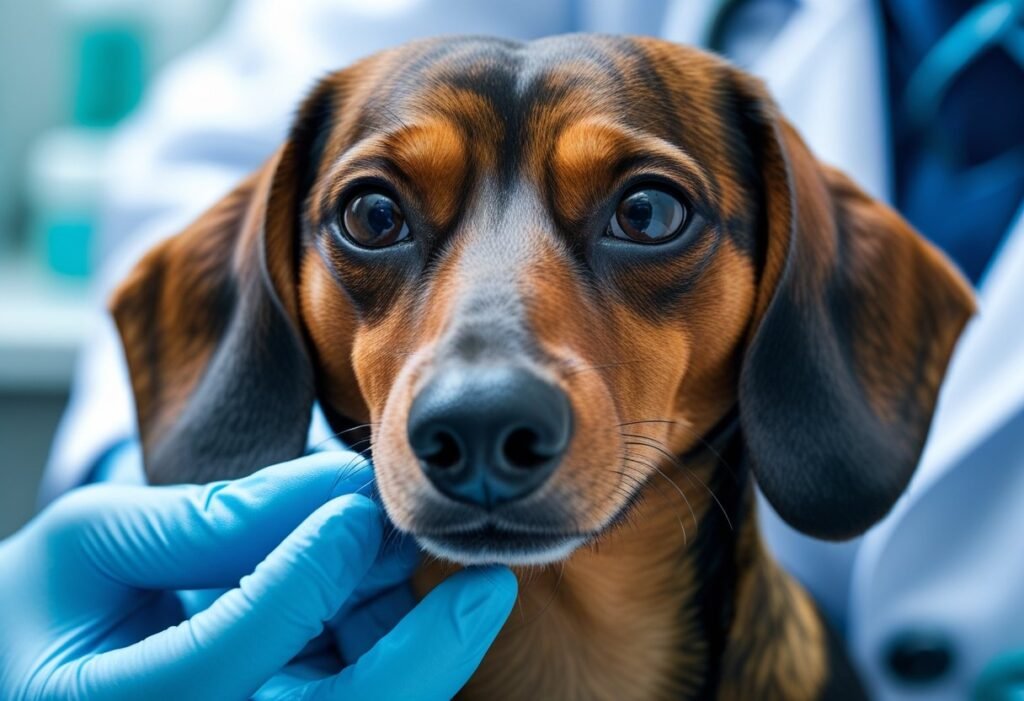
Vaccination Record Keeping 🗂️
Accurate records help you and your vet track which shots your dachshund needs 📖. Losing track can mean missed boosters or extra shots your dog doesn’t need ❌.
Keeping records is also important if you take your dog to a groomer, boarding, or travel ✈️. Make a habit of storing your dog’s vaccine paperwork in a safe, easy-to-find place 📁.
Many people now use a digital app or a folder on their phone to save vaccine dates, types, and reminders for the next appointment 📱. Here’s a simple way to keep track:
| Vaccine | Date Given | Next Due |
|---|---|---|
| Rabies | 2024-05-10 | 2027-05-10 🐾 |
| DHPP | 2024-06-01 | 2025-06-01 💉 |
| Leptospirosis | 2024-06-01 | 2025-06-01 🧪 |
Clear records make vet visits smoother and help keep your dachshund protected ✅.
Consulting with Your Veterinarian
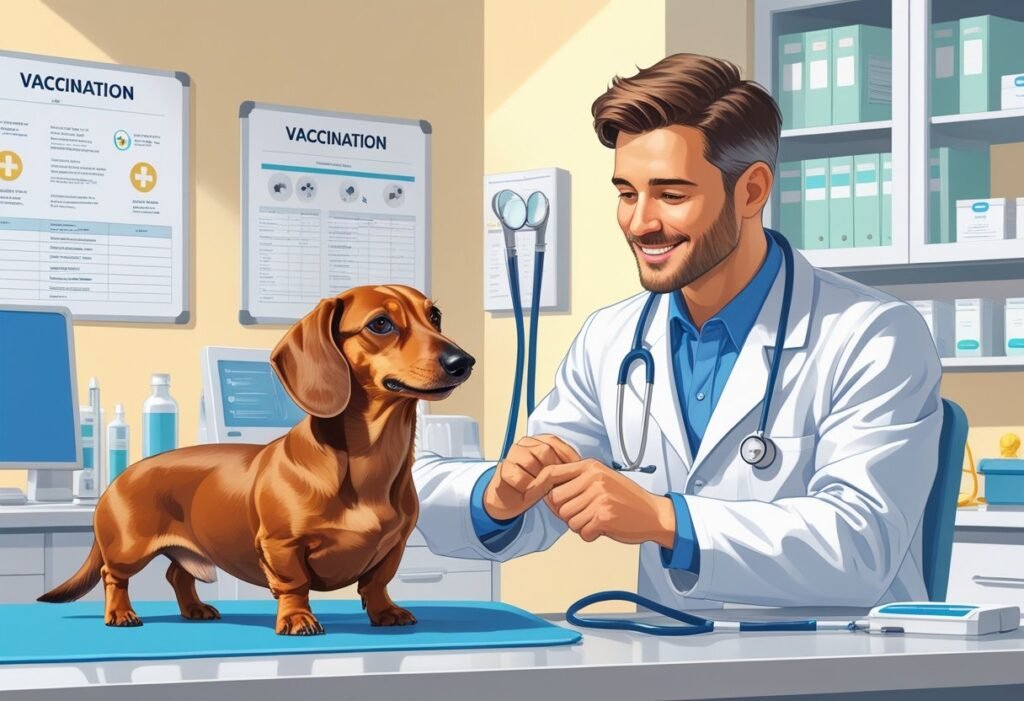
Your veterinarian is the best person to help you pick the right vaccines for your Dachshund 🐾. They look at your dog’s age, health, lifestyle, and risk factors before planning any vaccine schedule 🩺.
Discussing Your Dachshund’s Specific Needs 💬
Every Dachshund is different, and certain factors can change what vaccines are needed and when 🐕. Puppies need different shots than adult dogs 🐶.
Some vaccines are “core,” meaning every Dachshund should get them, like rabies and distemper 💉. Others are “non-core” and depend on where you live, if your dog travels, or if they spend time around other animals 🌎.
It helps to jot down questions or past health problems to share with your vet ✍️. Common things to discuss might include:
- Past vaccine reactions ⚠️
- Current medications or allergies 💊
- Plans for dog parks or boarding 🏞️
Your vet can review your Dachshund’s lifestyle in detail and explain which vaccines are required and which are optional ✅. This helps you skip unnecessary shots and avoid gaps in protection 🛡️.
💛 Vet-Day & Recovery Essentials for a Smooth Vaccination Experience
- 🎽 Coastal Pet Harness (IVDD Version) – Secure, supportive fit for gentle walks to keep your Dachshund comfortable before and after shots
- 🌿 Innovet PurCBD Oil – Natural calming support to ease stress and soreness on vaccination day
- 🫧 King Klean Dog Shampoo – Gentle, soothing bath option to keep skin comfortable if any irritation appears post-vaccine
- 🎨 Purr & Mutt Personalized Dachshund Art – Celebrate your pup’s healthy milestones and make vet visits feel rewarding
- 👕 Dog is Good Apparel & Gifts – Positive, feel-good gear to show pride and keep spirits high during recovery
🐾 Prep, soothe, and celebrate — these picks help you protect your Dachshund and support a calm recovery after vaccinations.
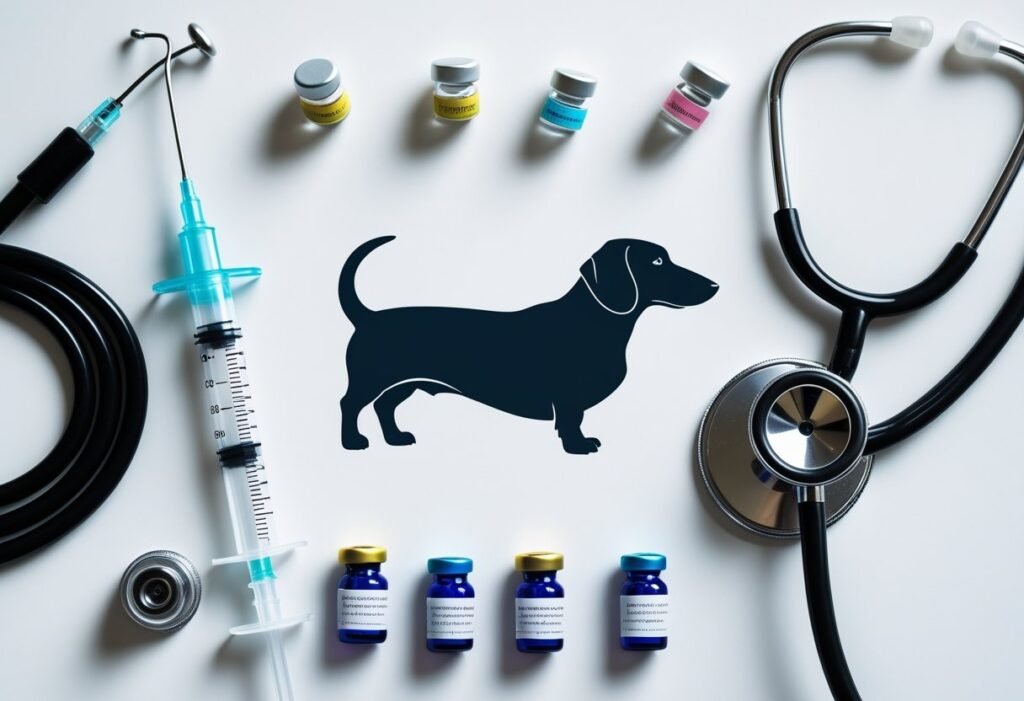
Building a Lifelong Health Plan 📅
Working with your veterinarian lets you create a health plan that fits your Dachshund’s life from puppy to senior years 🐾. The first set of shots usually starts at 6–8 weeks old and continues every few weeks ⏳.
Adult dogs get booster shots at regular intervals, often every one to three years 📆. Your veterinarian may keep a record of vaccine dates, brands, and batch numbers 🗂️.
Tracking this info is useful if you visit a new clinic or travel ✈️. A health plan includes reminders for boosters and checkups, plus tips on parasite prevention and nutrition 🍎.
Your vet can also suggest changes as your Dachshund ages or if health needs shift 🔄. That way, your dog stays protected at every stage of life 🌟.
🐾 Don’t Miss Out!
Download our free Dachshund care guide to keep your furry friend happy and healthy.
Get Your Free Guide 🐶Frequently Asked Questions
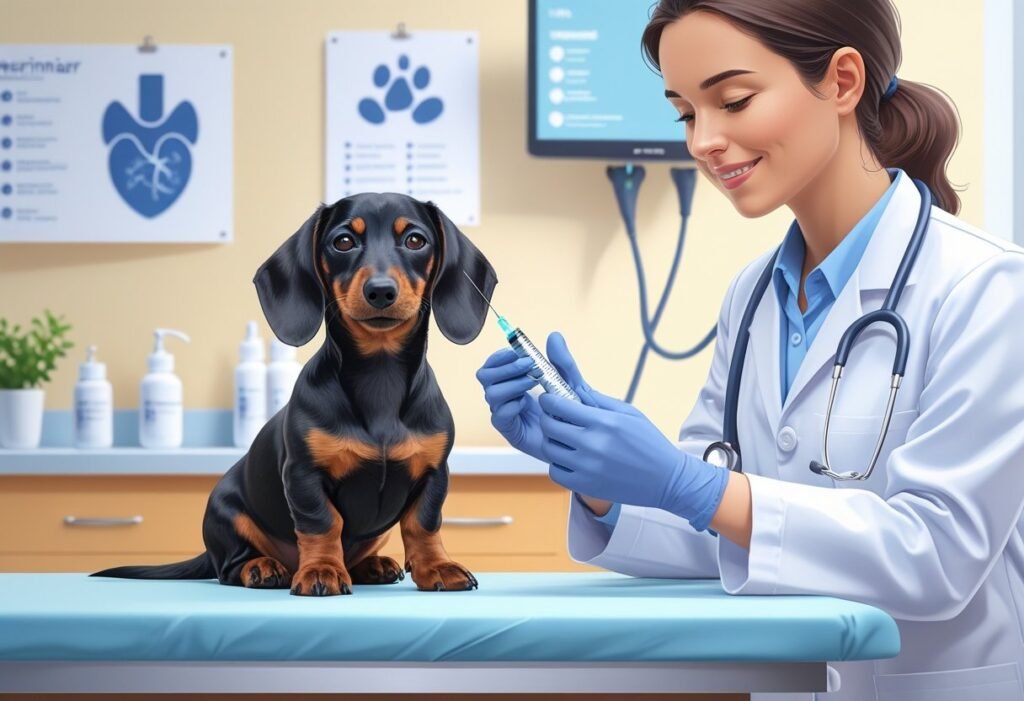
Dachshunds need a certain set of vaccines to stay healthy and protected from disease 🐾. Some vaccines are required early, while others need regular boosters to keep working 💉.
What is the recommended vaccination schedule for a Dachshund puppy? 📅
You should start your Dachshund puppy’s vaccines at 6 to 8 weeks old 🐶. Shots are given every 3 to 4 weeks until your puppy is about 16 weeks old ⏳.
Your veterinarian may adjust the schedule if your pup started vaccines late 🩺. It’s best to follow your vet’s advice for timing ✅.
Which vaccines are considered core for a Dachshund’s health? 🛡️
Core vaccines for Dachshunds include rabies, distemper, parvovirus, and adenovirus 🦠. These cover the most serious and common diseases for dogs.
Non-core vaccines are given based on your dog’s lifestyle and environment 🌎. Ask your vet what’s needed for your situation 🩺.
At what age should a Dachshund puppy receive its first vaccinations? 🐕
Your puppy should get its first set of shots between 6 and 8 weeks old 📆. This is when immunity from their mother starts to wear off 🍼.
Waiting longer can leave your puppy at risk for illness ⚠️. Don’t delay if you can help it 🚫.
How often should booster vaccinations be given to adult Dachshunds? 🔄
Most adult Dachshunds need booster shots once every 1 to 3 years after the puppy series 🐾. The exact timing depends on the vaccine and your veterinarian’s advice 🩺.
Rabies boosters are often given every 1 to 3 years as required by local law ⚖️. Always check with your vet for the most up-to-date schedule 📋.
What are the risks if my Dachshund misses a scheduled vaccine? ⚠️
If your Dachshund misses a vaccine, they won’t have protection against serious diseases like parvovirus or rabies ❌.
Sometimes, if too much time passes, your dog has to start the vaccine series over 🔁. That’s a hassle nobody wants 😕.
And honestly, in some places, you could even get into legal trouble if your dog isn’t current on rabies shots ⚖️.
How do combination vaccines, like the 5-in-1, differ from individual vaccines for dogs? 💉
Combination vaccines like the 5-in-1 cover several diseases in a single shot 🩺. That means your Dachshund gets fewer pokes and you make fewer vet visits 🐶.
Individual vaccines focus on just one disease at a time 🎯. Vets might use these if your dog only needs protection against specific illnesses 🧪.

